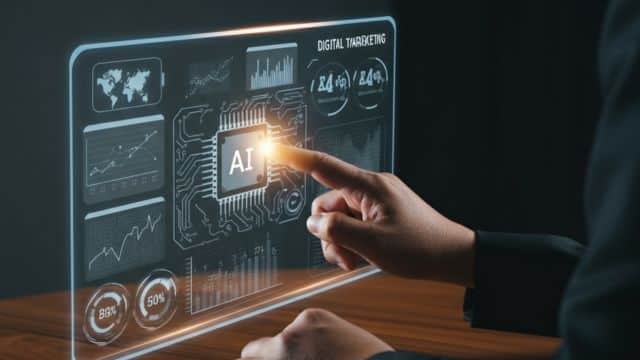Over 80% of digital marketing initiatives by 2025 will be driven by artificial intelligence (AI), therefore changing the way companies interact and reach consumers. From hyperpersonalizing to autonomous media buying, artificial intelligence is fundamentally changing the sector. This article looks at how AI in digital marketing playing a crucial role, notes the best AI marketing solutions for 2025, and investigates developing AI-driven trends.
Capended with forecasts for its long-term future, we will also examine real-world success stories and the difficulties of using AI in marketing along the road. This book covers tools like Jasper AI and ChatGPT as well as AI trends in digital marketing 2025.

Why Will Artificial Intelligence Be Essential for Digital Marketing in 2025?
The complexity of digital age data has exploded. Consumers leave enormous databases of digital footprints across IoT devices, websites, and social media platforms.
Analyzing this vast amount of data is what artificial intelligence excels at, which lets marketers provide very focused experiences right now. Gartner claims that companies using artificial intelligence for marketing personalization could experience up to a thirty percent rise in sales.
Predictive analytics made possible by artificial intelligence helps it to foresee consumer actions before they occur. AI systems, for example, can forecast when a consumer is likely to leave, which lets companies intervene early.
While automation simplifies daily chores like email marketing or social media posting, sentiment analysis guarantees brands know how consumers see their products or campaigns. These features make artificial intelligence absolutely essential for digital marketers of 2025.
Read More : 9 Best AI Tools for Documentation in 2025 – Ultimate Guide & Reviews
Leading Artificial Intelligence Tools for 2025 Digital Marketers
Marketers need strong tools if they want to flourish in this AI-driven terrain. The following is a closer examination of the top AI marketing technologies to make use of by 2025:
Jasper Artificial Intelligence
- Purpose: Content creation for advertisements, blogs, and more.
- Benefits: Quick creation of customized material, simplicity of usage, interaction with systems like PHP.
- Challenges: One challenge for new users is learning how to prompt successfully.
- Use Case: Jasper is used by a travel firm to create excellent blog entries ideal for SEO, therefore saving hours of hand-written work.
Visit Jasper AI’s website for more details.
Frase / Surfer SEO
- Purpose: Content optimization using SEO analytics, topic clusters, and keyword recommendations.
- Benefits: Useful actionable data for raising rankings.
- Cons: Small firms could find expenses exorbitant.
- Use Case: A mid-sized e-commerce retailer generates Google-ranking optimized product pages.
Discover more about Frase and Surfer SEO.
HubSpot AI
- Purpose: Email marketing automation and CRM.
- Benefits: A comprehensive platform combining artificial intelligence with conventional CRM technologies.
- Cons: Its powers can make one feel overburdened.
- Use Case: Using HubSpot AI, a SaaS business automates customized sales emails, hence raising lead response rates by forty percent.
Learn more at HubSpot AI’s website.
ChatGPT
- Purpose: Chatbot support and dynamic content production.
- Pros: Supports natural language, boasts industry-leading chatbot capabilities.
- Cons: Sometimes responses lack subtlety or inventiveness.
- Use Case: ChatGPT greatly lowers resolution times by a retailer using it for customer service.
Explore ChatGPT’s capabilities here.
AI-Driven Patterns Changing 2025

Hyper-Personalization Using Machine Learning
By means of machine learning, AI-based personalization technologies in 2025 will customize material per user. Hyper-personalization increases involvement and conversions whether it comes to generating original ad experiences or tailored product recommendations.
Emotional Intelligence AI Chatbots
By means of tone and word choice, artificial intelligence chatbots have developed to sense consumer emotions. These bots’ delicate response made possible by their emotional intelligence increases consumer happiness. Try exploring advancements similar to this on MIT Technology Review.
Forecasting Customer Journeys
Now that artificial intelligence systems forecast the actions consumers are most likely to take, companies can maximize their websites and marketing campaigns to gently lead them into purchases.
Self-Directed Media Buying
By automatically bidding on the most successful placements in real-time, artificial intelligence simplifies ad spend. With little effort, this trend is helping companies reach maximum return on investment.
Voice and Visual Search Optimization
Search engine optimization depends on AI-driven visual and voice search tools more and more. Marketers are changing their approaches to fit searches including “AI-based personalizing tools 2025” and visual search results.
Case Studies & Real-World Illustrations
Amazon
With more than 35% of its whole income coming from its recommendation engine, Amazon runs on artificial intelligence. From product recommendations to route optimization, artificial intelligence is essential for Amazon’s success. Explore more on Amazon AI’s impact.
Netflix
Using artificial intelligence, Netflix forecasts consumer preferences and analyzes viewing behavior to provide very accurate recommendations keeping members interested. Netflix’s AI success can be learned in detail from this source.
Spotlight on Startups
Lead generation using ChatGPT by a tiny software business produced tailored outreach messages that raised 25% conversion rates. Read similar stories on Crunchbase.
AI’s Difficulties with Digital Marketing

Issues of Data Privacy
Governments all around are enforcing more stringent rules including GDPR and CCPA, which demand companies to treat consumer data with great care. Learn more about GDPR compliance here.
Algorithmic Bias
Sometimes artificial intelligence models reflect prejudices in the training data, which results in distorted insights or discriminatory targeting policies. Discover more about this issue in Harvard Business Review’s article.
Learning Curve and Cost
Using AI tools calls both a learning curve and an initial outlay of money.
Content Integrity
Sometimes artificial intelligence-generated entertainment lacks the authenticity or human touch required to really appeal to viewers.
Beyond 2025: What to Anticipate?
AI promises to advance much more between 2026 and 2030. Omnichannel campaigns will be created in greater part using generative artificial intelligence. AI paired with AR/VR will also produce immersive brand experiences, thereby providing consumers with a fresh degree of involvement. These developments will allow marketers to reach audiences in previously unimaginable ways.
Conclusion
Artificial intelligence is the engine guiding digital marketing’s present rather than only its future. The opportunities are infinite—from real-time customization to emotional AI chatbots. To fully grasp the technology’s promise, though, marketers will have to overcome issues including data privacy and algorithmic bias as it evolves.
Which artificial intelligence trend, in five years, do you believe will rule marketing most? Share your ideas below, and remember to subscribe for further analysis on the direction of artificial intelligence in marketing!
Read More : Which Is Easy Cybersecurity or Artificial Intelligence? A Complete Comparison


